The Sweet Spot for THC Edibles Prices Revealed

Understanding THC Edibles Prices: What You Need to Know
THC edibles price varies widely across products, brands, and locations. Here's a quick breakdown of what you can expect to pay:
| Product Type | Average Price | Price Per mg of THC |
|---|---|---|
| Standard Gummies (100mg pack) | $13.86 - $25 | $0.14 - $0.20 |
| Premium Gummies | $40 - $60 | $0.20 - $0.30 |
| Chocolates/Baked Goods | $25 - $35 | $0.20 - $0.25 |
| Beverages | $8 - $35 | $0.26 - $0.40 |
The cannabis edibles market has evolved dramatically, with prices becoming more competitive. When shopping, understanding both the package price and cost per milligram gives you the clearest picture of value.
The national average price for THC edibles is currently $13.86 per package, with the cost per milligram dropping from $0.18 in 2021 to $0.14 in 2022. This trend shows that while cannabis products remain premium items, they're becoming increasingly affordable.
Prices vary significantly by state, with Michigan and Delaware offering the lowest price ranges ($4-$22), while states like Arizona, Missouri, and Utah tend to have the highest prices (averaging around $27 per package).
I'm Max Shemesh, founder of Zaleaf, and I've spent years analyzing THC edibles price trends across multiple markets to ensure our customers receive the best value without compromising on quality.
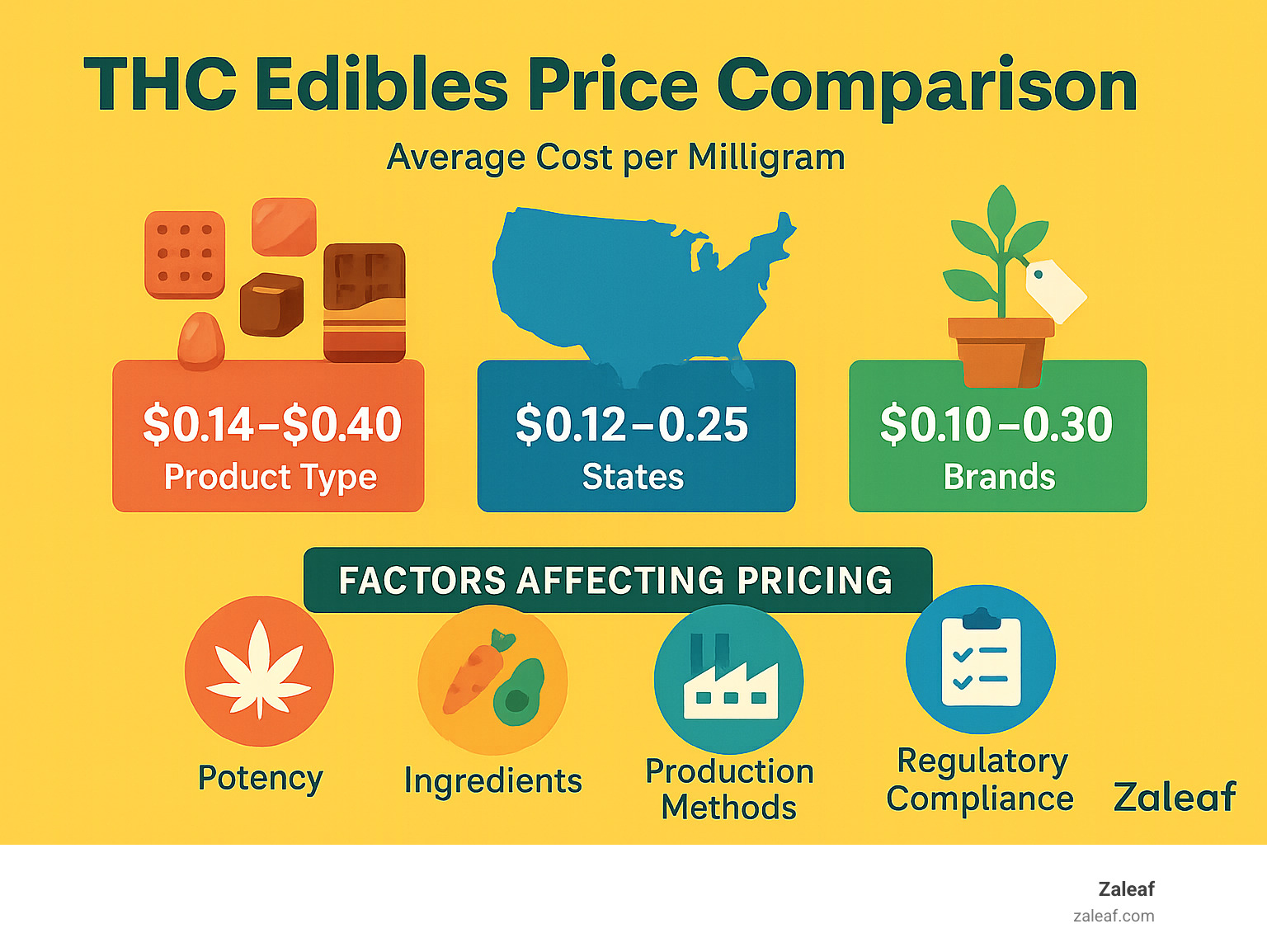
Key terms for THC edibles price: - THC edibles guide - buy edibles online - fast shipping edibles
THC Edibles Price: National Benchmarks & State Variations
Good news for cannabis enthusiasts – THC edibles prices have been dropping steadily! Over the past three years, we've seen prices fall by 8.7%, from $15.72 to $13.86 per package on average. This reflects a maturing market with more competition and improved production efficiency.
When helping customers understand pricing at Zaleaf, I always explain two important numbers:
- The sticker price (what you'll pay at checkout)
- The cost per milligram of THC (your true value metric)
That second number has dropped from $0.18 per mg in 2021 to $0.14 in 2022. For regular users, this means your cannabis budget stretches further than ever before!
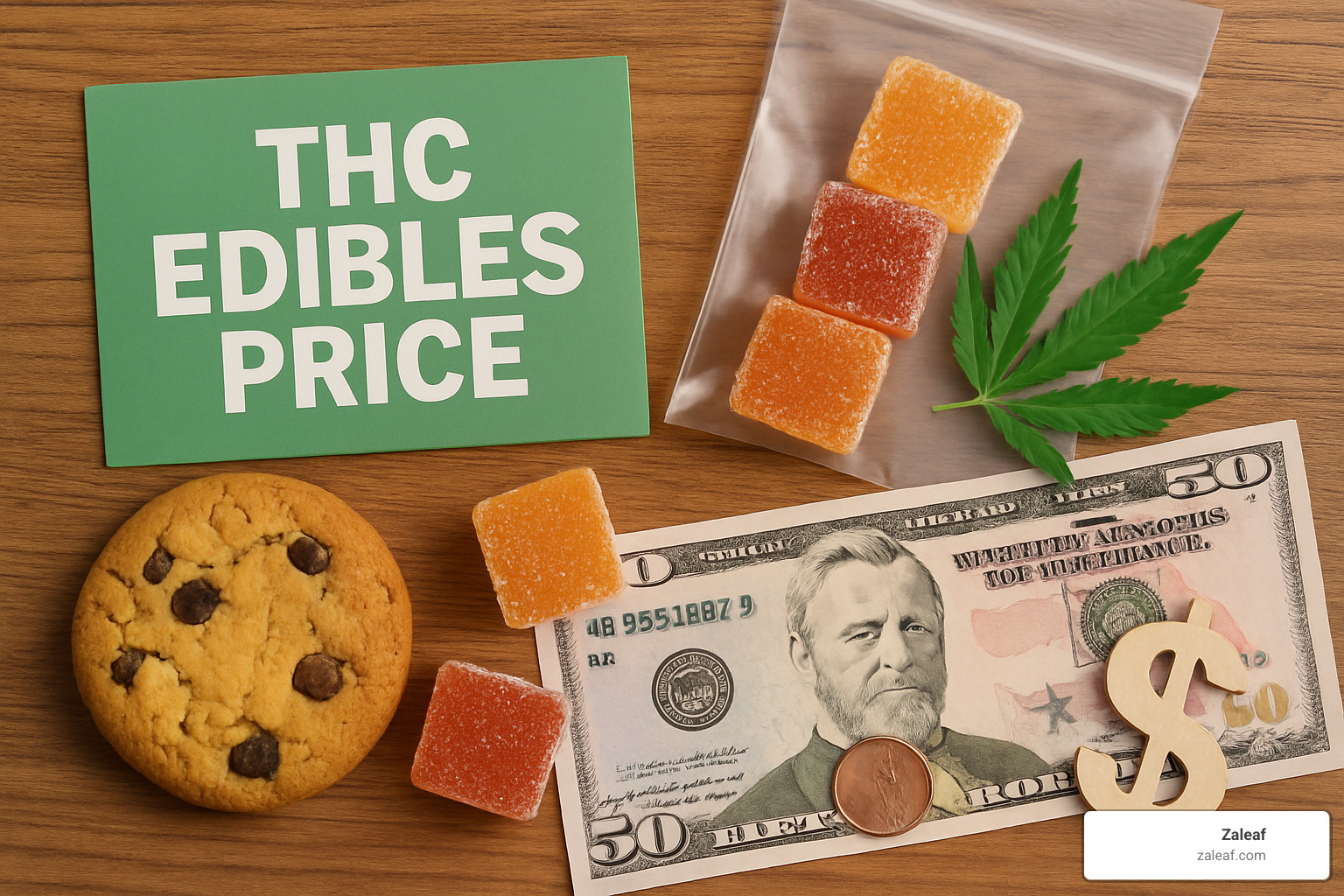
Of course, these national averages only tell part of the story. The THC edibles price varies dramatically depending on where you live. Several factors create these state-by-state differences:
Regulatory frameworks differ wildly between states. Tax structures can be particularly brutal, with some states piling on taxes exceeding 40%! Market maturity plays a huge role too – newer markets typically charge more until competition increases.
Here's a snapshot of what you might pay across different states:
| State | Average Price Range | Notes |
|---|---|---|
| Michigan | $4 - $22 | Most affordable market |
| Delaware | $4 - $22 | Tied for most affordable |
| Oregon | $10 - $25 | Mature market with good competition |
| California | $17 - $23 | High competition but heavy taxes |
| Illinois | $20 - $40 | Higher prices due to limited licenses |
| Arizona | ~$27 | Among the most expensive markets |
| Missouri | ~$27 | New recreational market with high prices |
| Utah | ~$27 | Limited medical program with high prices |
Average THC edibles price per mg in 2024
In my experience, the sweet spot for THC edibles price per milligram typically falls between $0.14-$0.20 in 2024. This range represents fair pricing for most product categories.
Different edible types come with different price expectations. Gummies typically run $0.14-$0.20 per mg. Chocolates and baked goods cost a bit more ($0.18-$0.25 per mg) because of their pricier ingredients. Beverages command the highest premium at $0.26-$0.40 per mg due to their complex formulation process.
According to Headset analytics, beverages average $0.26 per mg, while standard edibles hover around $0.20 per mg. Tinctures and topicals tend to be the priciest at $0.32 per mg.
State-by-state THC edibles price hot list
The geography of THC edibles prices reveals some fascinating patterns that smart shoppers can use to their advantage:
California: The Golden State's mature market offers 100mg THC gummy packages typically between $17–$23. But beware the tax stack! California's combined taxes can add a whopping 30-40% to your final price.
Illinois: With limited licensing creating less competition, Illinois consumers pay a premium, with 100mg THC edible packages ranging from $20–$40.
Michigan: A true consumer paradise! Michigan's highly competitive market offers some of the nation's lowest prices, with edibles ranging from $4–$22.
Utah: With its restrictive medical program and limited competition, Utah consumers face some of the highest prices nationwide, averaging around $27 per standard package.
Regional supply chains play a crucial role in these variations. States with abundant cultivation and manufacturing facilities typically offer lower prices, while those with restricted licensing command premiums.
At Zaleaf, we steer these complex regulations to offer consistent pricing and 100% legal products with fast shipping nationwide.
What Drives THC Edibles Cost? Ingredients to Regulations
Ever wonder why some gummies cost twice as much as others? Let's pull back the curtain on what actually determines THC edibles price so you can shop smarter.
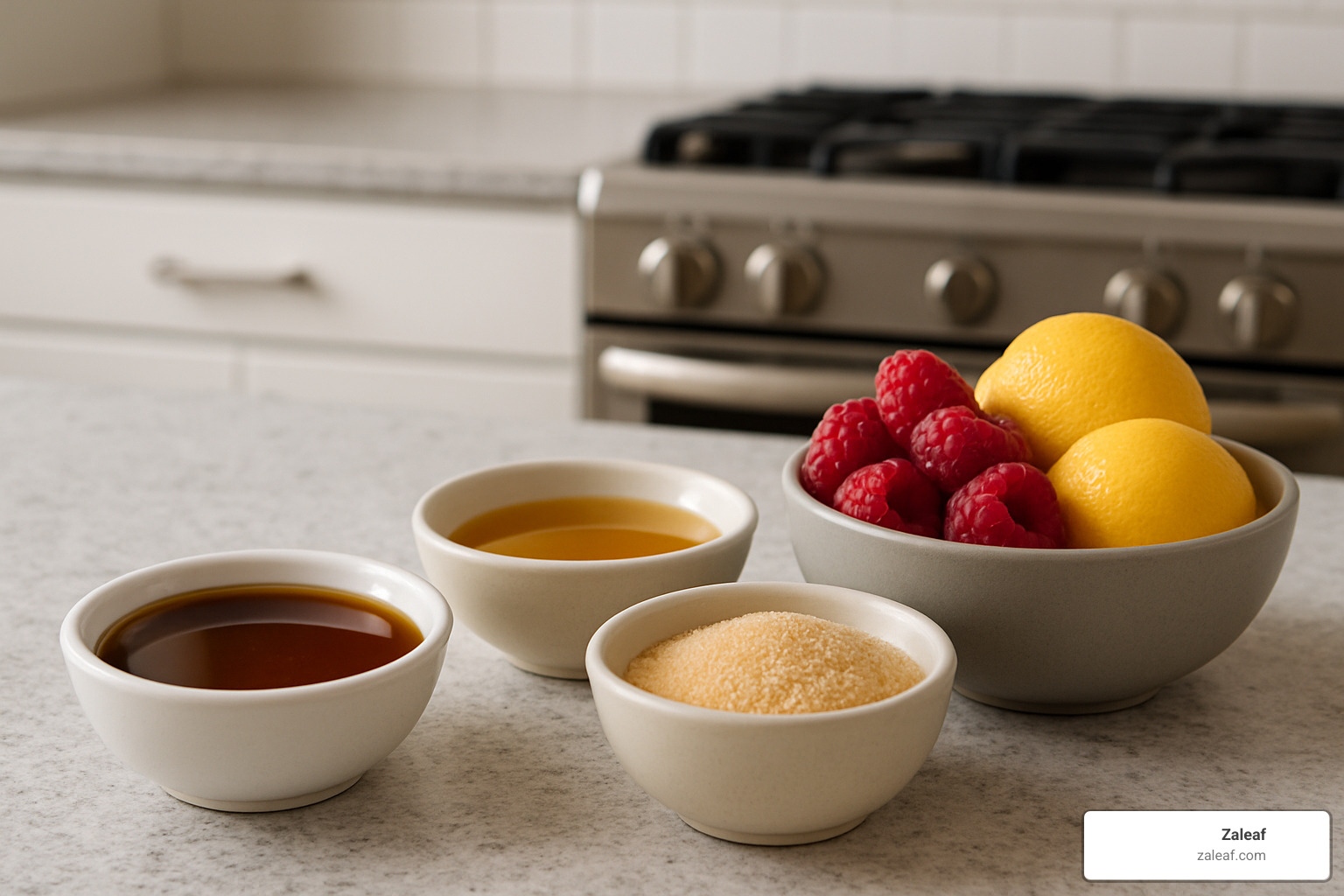
When I first started Zaleaf, I was shocked at the price differences between seemingly similar products. Several key factors work together to create that final price tag you see.
Potency is probably the most obvious factor – higher THC content generally means you'll pay more. A 1000mg package will cost more than a 100mg package (though you'll usually save on the per-mg price when buying stronger products).
Those premium ingredients matter too. Organic sugar, real fruit extracts, and vegan-friendly pectin all push prices upward – but they also create a better experience.
Branding plays a surprisingly big role. Established names with fancy packaging can charge 30-40% more for essentially the same product.
Then there's all the regulatory hoops manufacturers jump through. Child-resistant packaging isn't cheap, and detailed labeling requirements add to production costs.
Lab testing is another non-negotiable cost that good companies absorb. Each batch needs verification for potency and purity.
The source material makes a difference too. Hemp-derived THC products (containing ≤0.3% Delta-9 THC) generally cost less than marijuana-derived options because they operate under different regulatory frameworks.
Finally, basic supply and demand economics apply. Newer markets with limited competition typically have higher prices until more producers enter the scene.
Potency & dose count: low vs high strength gummies
The strength of your edibles dramatically affects what you'll pay:
Those beginner-friendly low-dose gummies (5-10mg THC per piece) usually run $10-$20 for a 10-piece package. While convenient for newcomers, you'll pay more per mg of THC – often $0.20-$0.40/mg.
Moving up to moderate-dose options (10-20mg per piece), expect to pay $20-$40 for a 10-pack. These hit the sweet spot for regular users with some tolerance, with a more reasonable $0.15-$0.25/mg.
For the cannabis veterans, high-dose gummies (25-100mg per piece) cost $40-$60+ per package but offer better value at $0.12-$0.20/mg.
The real value champions are bulk options with 1000mg+ total THC, priced around $100-$200. Frequent users get the best deal here at just $0.10-$0.18/mg.
Ingredient quality & third-party COAs
Not all gummies are created equal, and quality ingredients directly impact THC edibles price. When you see a premium price tag, you should be getting:
Natural fruit flavors that taste like actual fruit. Organic sweeteners instead of high-fructose corn syrup. Vegan-friendly pectin bases rather than animal gelatin. And ideally, full-spectrum extracts that preserve beneficial terpenes and minor cannabinoids.
But how do you know you're actually getting what you pay for?
This is where third-party Certificates of Analysis (COAs) become your best friend. These lab reports from independent ISO 17025-accredited laboratories verify both potency and purity.
A shocking 2015 JAMA study found nearly 60% of California edibles mislabeled their THC content. If a product claims 100mg but only contains 70mg, you're actually paying 43% more per mg than advertised!
That's why at Zaleaf, every product comes with a comprehensive COA accessible via QR code.
Legal & regulatory overhead
The complex legal landscape for cannabis adds significant costs that ultimately reach your wallet:
State licenses can cost manufacturers hundreds of thousands annually. Taxes range from 15% to 40% depending on location. Special packaging requirements add production costs. And compliance testing adds $300-$1000 per batch.
These regulatory problems explain why THC edibles prices in legal markets sometimes exceed black market prices. But the safety, consistency, and legal protection are worth the premium.
The good news? Hemp-derived products (like those we offer at Zaleaf) face fewer regulatory barriers in many states, allowing for more competitive pricing while maintaining full legality under the 2018 Farm Bill.
Calculating Value: Cost-Per-Milligram & Dose Ranges
Want to know if you're getting a good deal on your THC gummies? The secret isn't just looking at the package price – it's understanding the cost per milligram. This simple calculation is your best friend for comparing products fairly:
Cost per mg = Total Price ÷ Total mg of THC
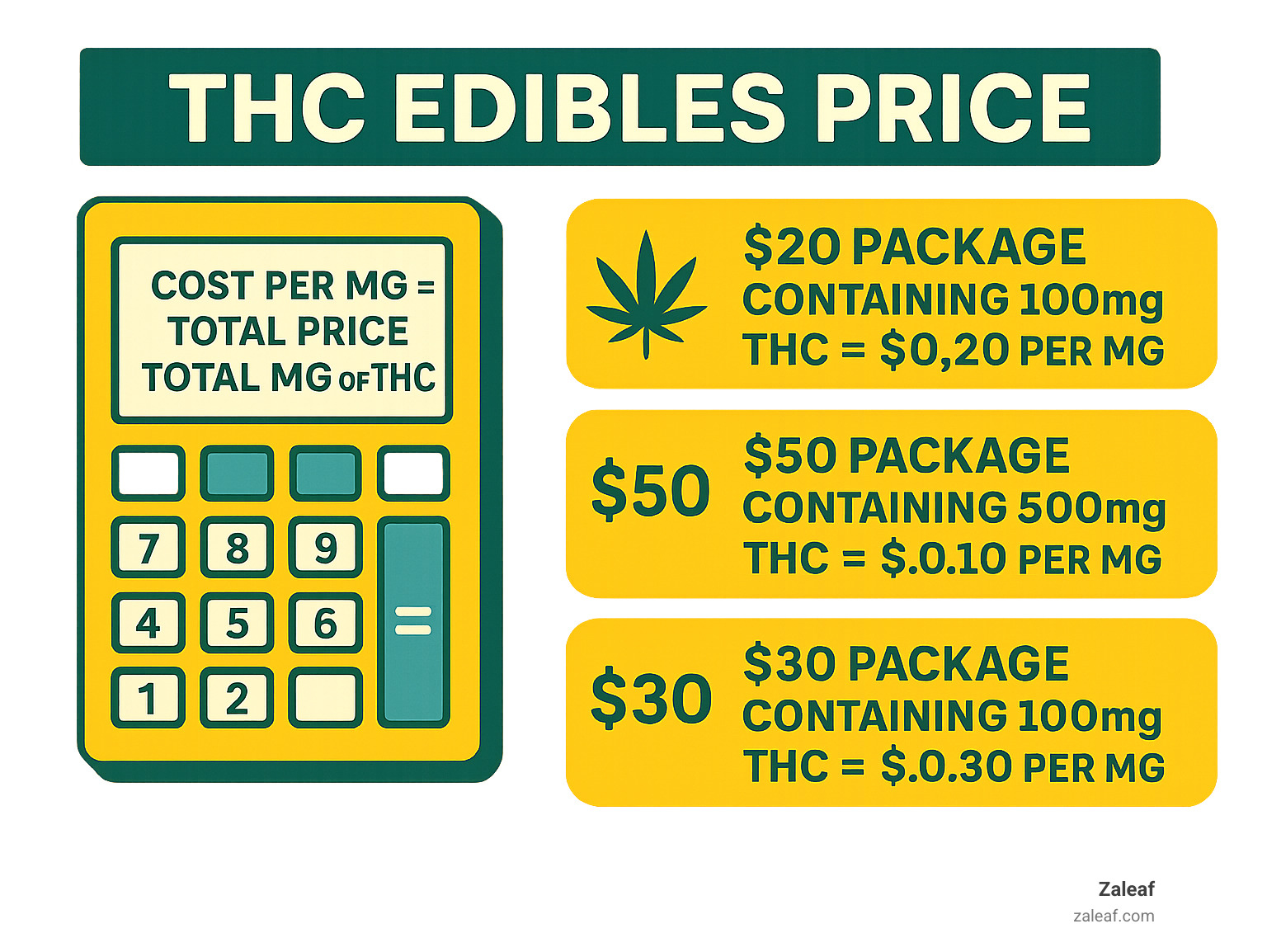
Think of it like checking the price per ounce at the grocery store – it reveals the true value beyond flashy packaging. For instance:
A $20 package with 100mg THC costs $0.20 per mg, while a $50 package with 500mg THC comes to just $0.10 per mg. That second option gives you twice the value, even though the upfront cost is higher!
In today's market, you'll want to aim for somewhere between $0.14-$0.20 per mg for a fair deal. When you see prices significantly higher, ask yourself what extras you're getting – are they using organic ingredients? Special formulations? Unique cannabinoid blends?
Buying in bulk almost always saves money in the long run. Those higher-potency packages might cost more upfront, but they typically offer a much better per-milligram value.
THC edibles price calculator walk-through
Let's put this into practice with a real-world example:
You spot some gummies for $30, and the package says they contain 100mg of THC total. Let's do the math:
$30 ÷ 100mg = $0.30 per mg
That's above our $0.14-$0.20 benchmark. Should you walk away? Not necessarily! Consider the whole picture:
Does the brand use premium ingredients like organic cane sugar instead of corn syrup? Are they made with real fruit extracts rather than artificial flavors? Quality ingredients often justify higher prices.
Is there comprehensive testing with easily accessible lab reports? Are there additional beneficial compounds like rare cannabinoids or specific terpene profiles for targeted effects?
If none of these factors apply, you might be better off looking elsewhere. Watch out for red flags like prices above $0.40 per mg without clear quality differences, missing lab tests, or confusing labeling.
Hemp-derived vs marijuana-derived cost gap
You might notice a significant price difference between products that look almost identical. The source of the THC often explains this gap:
Hemp-derived THC products (what we specialize in at Zaleaf) typically cost between $0.10-$0.18 per mg. These products are federally compliant under the 2018 Farm Bill, containing ≤0.3% Delta-9 THC by dry weight. The benefits? We can ship them nationwide, you don't need a medical card, and they avoid the heavy cannabis-specific taxes.
Marijuana-derived THC products usually run $0.15-$0.30 per mg. These are only available in states with medical or recreational programs, can't cross state lines, require dispensary visits, and often come with hefty cannabis taxes that can add 15-40% to your bill!
This explains why you might see what looks like the same product at dramatically different THC edibles price points. At Zaleaf, we've focused on creating hemp-derived options that deliver the same quality experience without the dispensary markup.
Smart Shopping: Online vs In-Store & Money-Saving Tips
Savvy consumers can significantly reduce their THC edibles price by shopping strategically. There are several proven ways to save without compromising on quality or safety.
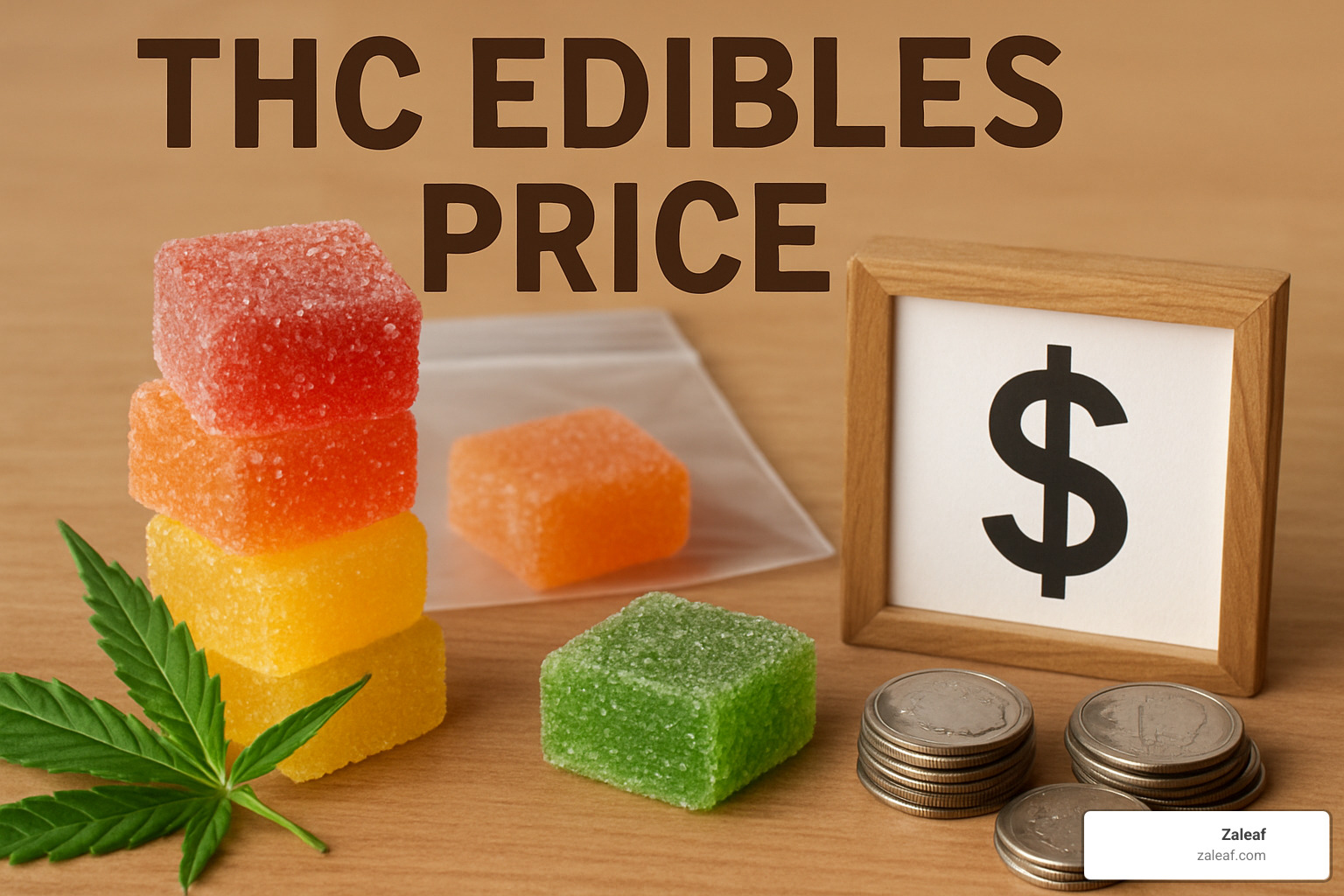
Looking for a good deal? Many online retailers offer coupon codes of 15-30% off for first-time buyers or email subscribers. If you're a repeat customer, take advantage of loyalty programs where you can earn points toward future purchases.
For those who use edibles regularly, consider bulk bundles that typically save you 15-25% when buying multiple items together. Even better, many companies like us at Zaleaf offer subscription plans that can save you up to 33% with recurring deliveries.
Don't forget to watch for off-peak sales during holidays or end-of-season clearance events. These can offer some of the deepest discounts of the year.
While homemade options can reduce costs for frequent users, I always remind our customers that saving money should never mean compromising on safety. The lowest price isn't always the best value, especially if it means untested products or inaccurate potency.
Online THC edibles price advantages
Shopping online offers several distinct advantages for budget-conscious edible enthusiasts:
The subscription discounts available online are hard to beat – at Zaleaf, we offer 15-33% savings for customers who set up regular deliveries. Since online stores don't have the high rent and staffing costs of physical dispensaries, we can pass those savings directly to you.
One of my favorite things about online shopping is the ability to easily compare prices across multiple retailers without burning gas driving around town. You can also access a broader selection of brands and product types than most local stores carry.
Many customers appreciate the discreet delivery that arrives in unmarked packaging for privacy. And you can take your time researching without feeling the pressure of a salesperson hovering nearby.
Perhaps most importantly for hemp-derived products, online retailers offer multi-state access since these legal products can be shipped nationwide. This is especially valuable if you live in an area with limited local options.
In-store dispensary perks & hidden costs
Physical dispensaries have their own unique benefits, though they typically come with higher THC edibles prices:
The personalized budtender advice can be invaluable, especially for beginners. These knowledgeable staff can help you find the perfect product for your needs. There's also something to be said for same-day access – when you want relief now, not in 3-5 business days.
Being able to see before you buy and examine packaging in person gives some customers added confidence. Many people also value the opportunity to support local business.
However, be aware of the hidden costs that can inflate in-store prices. Local tax add-ons can be substantial – many municipalities add their own cannabis taxes on top of state taxes, sometimes pushing the total tax burden to 30-40%!
Dispensaries typically have a limited selection compared to online retailers, meaning fewer opportunities to compare prices. The retail environment is also designed to encourage impulse purchases.
For marijuana-derived products in legal states, dispensaries remain the only legitimate option. For hemp-derived options, however, online retailers like Zaleaf often provide better value while maintaining complete legality.
DIY edibles: is it really cheaper?
Many customers wonder if making their own edibles could save money. The honest answer depends on several factors:
The initial investment can be substantial. You might need a decarboxylation device or at least an oven ($0-$250), an infusion machine or stovetop method ($0-$350), plus molds and kitchen tools ($20-$100).
The ongoing costs include flower or concentrate ($5-$15 per gram), other ingredients like sugar and flavorings ($10-$30 per batch), plus a minimal amount for electricity or gas.
Beyond the financial considerations, homemade edibles often lack precise dosing. This can lead to inconsistent experiences. The DIY process requires time and skill that not everyone has or wants to develop.
Be aware that legal limits on homemade production exist in many areas, even in states with recreational cannabis.
For frequent consumers who already have the necessary equipment and enjoy the process, DIY can be cost-effective in the long run. For occasional users, the upfront costs and time investment may not justify the savings.
More info about Smart Shopping
Frequently Asked Questions about THC Edibles Price
Why do THC gummies sometimes cost more than brownies?
Gummies tend to be pricier because they stay fresh for 6-12 months, while brownies might start deteriorating after just a couple weeks. The manufacturing process for gummies also ensures each piece contains almost exactly the same amount of THC.
THC edibles price differences also come down to production complexity. Making good gummies requires specialized equipment and expertise. Many premium gummy brands use organic sweeteners and natural flavors, which bump up the cost but deliver a cleaner taste experience.
There's also the simple fact that gummies are what most people want – they're discreet, portable, and don't crumble in your bag. Higher demand naturally leads to premium pricing.
But here's a little secret: when you break it down by milligrams of THC, gummies often give you better value. A $25 pack of gummies with 100mg total THC costs $0.25 per mg, while a $15 brownie with just 50mg THC actually costs $0.30 per mg.
How has the THC edibles price changed over the last three years?
Good news for your wallet – THC edibles prices have been steadily dropping over the past few years:
- 2021: $15.72 per package (around $0.18 per mg of THC)
- 2022: $14.50 per package ($0.16 per mg)
- 2023: $14.00 ($0.15 per mg)
- 2024: $13.86 ($0.14 per mg)
That's an 8.7% decrease over three years! This welcome trend comes from several factors: more brands creating healthy competition, more efficient production processes, stabilized supply chains in mature markets, and improved extraction technologies.
The price drops haven't been uniform across the country. Oregon has seen prices plummet by 32% per mg, while Michigan enjoys a 26% reduction. California prices have dropped by about 15%. Meanwhile, newer cannabis markets have seen minimal reductions as they find their footing.
What's a "good" price for a 100 mg gummy pack today?
Finding the sweet spot for THC edibles price can be tricky. Here's what you can expect to pay for a standard 100mg THC gummy pack in today's market:
- Budget tier ($13-$18): Basic ingredients, limited flavor options, standard potency testing, simple packaging
- Mid-tier range ($18-$25): Better ingredients with natural flavors, more sophisticated formulations, full panel testing, child-resistant packaging, established brands
- Premium tier ($25-$35): Organic and all-natural ingredients, improved cannabinoid profiles, specialized effects formulations, comprehensive testing, premium packaging
If you see anything priced above $35 for a standard 100mg package, it should offer something truly exceptional to justify that premium.
At Zaleaf, we position our products in that sweet spot of $18-$25, offering premium quality without the premium markup.
These benchmarks apply to hemp-derived products. If you're shopping at a dispensary for marijuana-derived products, expect to pay 20-40% more due to additional regulatory costs and taxes.
Conclusion
Finding the sweet spot for THC edibles price is a bit like searching for the perfect recipe – it requires balancing quality, potency, and value. Most consumers find their happy place between $0.14-$0.20 per milligram of THC, with total package prices of $18-$25 for standard 100mg products.
Throughout our exploration of edibles pricing, several important insights have emerged. First, calculating cost per milligram gives you the clearest picture of what you're really paying for. It's like comparing the price per ounce at the grocery store – this simple math reveals the true value beneath flashy packaging.
Beyond just numbers, consider what goes into your edibles. Premium ingredients and comprehensive testing might justify a slightly higher price tag.
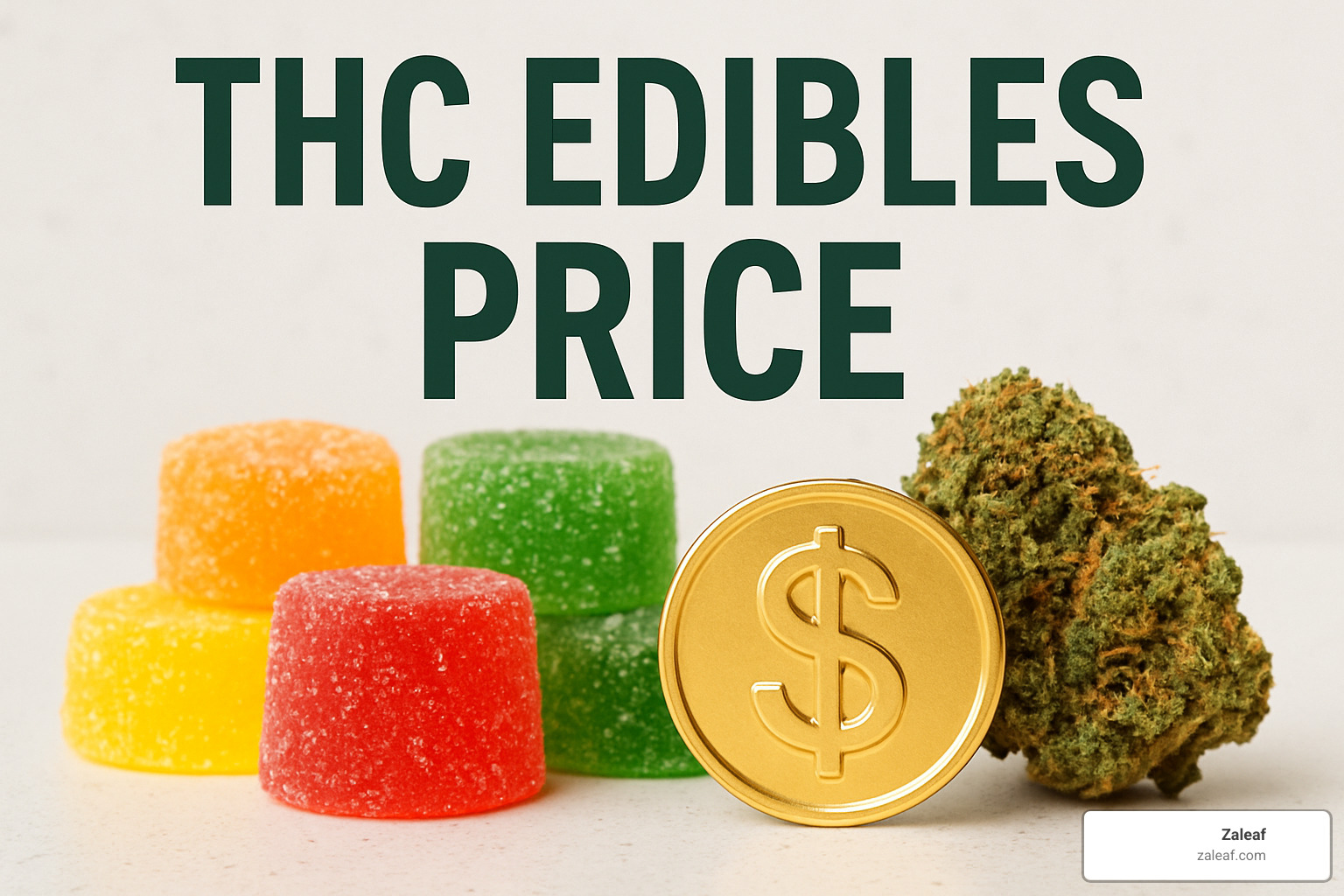
The shopping experience itself matters too. Online retailers often offer better deals than brick-and-mortar dispensaries, thanks to lower overhead costs and the ability to compare options easily. That said, nothing quite replaces the personalized guidance of a knowledgeable budtender for newcomers.
Perhaps most surprising is the dramatic price variation between states – we're talking differences of up to 600% for essentially identical products! Michigan consumers might pay just $4 for what costs Utah residents $27.
For regular users, subscription models have emerged as a particularly smart way to save. These "set it and forget it" options typically knock 15-33% off retail prices while ensuring you never run out of your favorite products.
At Zaleaf, we've built our approach around delivering genuine value through competitive pricing that aligns with industry benchmarks. We believe premium ingredients and improved cannabinoid profiles shouldn't come with luxury markups. Our comprehensive third-party testing ensures you're getting exactly what you pay for.
We also understand that convenience matters. That's why we offer fast shipping and discreet packaging nationwide, with no ID or medical card requirements.
Whether you're making your very first purchase or you're a seasoned cannabis enthusiast, understanding what drives THC edibles price empowers you to make choices that balance your budget with your desired experience. The perfect edible is out there – one that delivers the effects you want at a price that feels right.
Ready to experience premium THC edibles at fair prices? Explore our THC gummies collection and find the perfect balance of quality and value.

